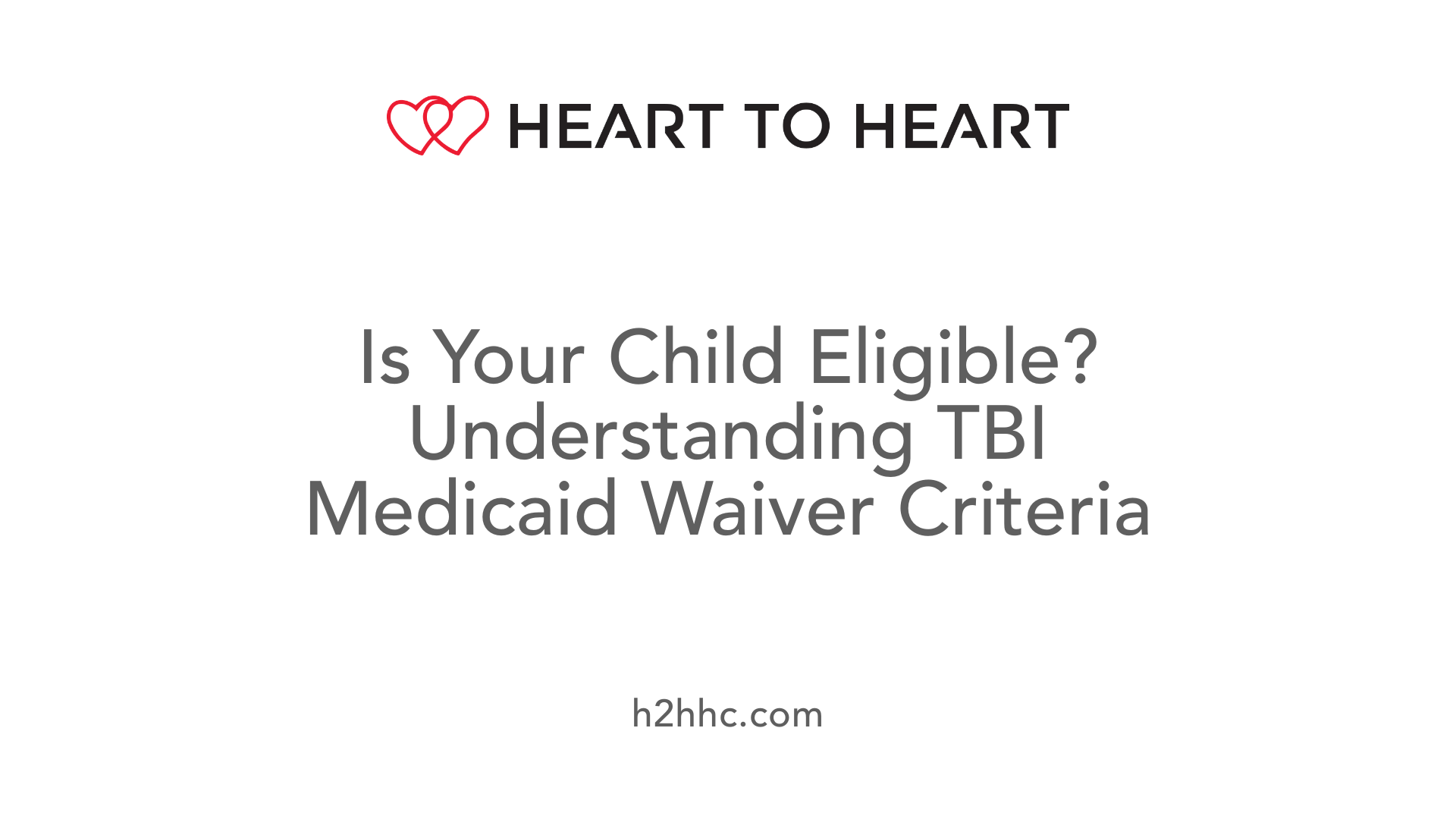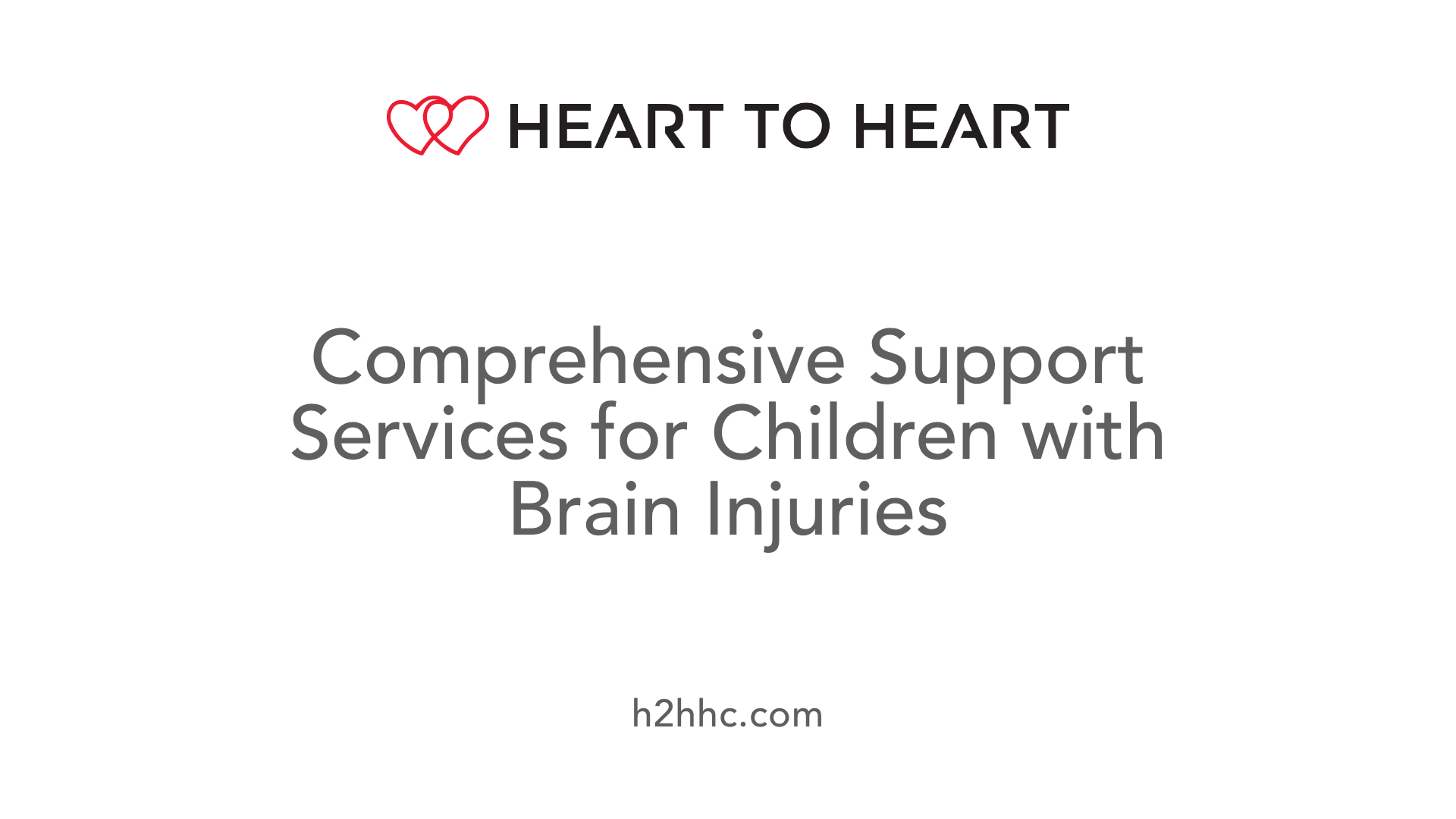Enhancing Community Living for Children with Brain Injuries
May 22, 2025

Traumatic Brain Injuries (TBI) can significantly impact a child's ability to perform daily activities and participate fully in community life. Recognizing these challenges, the TBI Medicaid Waiver Program provides vital support through personalized, community-based services designed to promote independence and improve quality of life for affected children and their families.
 The Traumatic Brain Injury (TBI) Medicaid Waiver is designed to support individuals, including children, with brain injuries by providing tailored community-based services. Its core purpose is to foster independence and encourage active participation within the community. The program recognizes that each individual has unique needs and thus adopts a person-centered care approach to ensure that services and supports are customized accordingly.
The Traumatic Brain Injury (TBI) Medicaid Waiver is designed to support individuals, including children, with brain injuries by providing tailored community-based services. Its core purpose is to foster independence and encourage active participation within the community. The program recognizes that each individual has unique needs and thus adopts a person-centered care approach to ensure that services and supports are customized accordingly.
A primary goal of the waiver is to help children and young people with brain injuries avoid or delay institutionalization, such as prolonged stays in nursing homes or residential facilities. Instead, it promotes living in familiar environments—whether at home or in community settings—by offering services that assist with daily activities, rehabilitation, and emotional and social development.
The program also emphasizes recovery and self-determination. By providing therapies, environmental modifications, and support coordination, it aims to enhance the individual's ability to regain skills and achieve personal goals. These supports are designed to facilitate greater autonomy, enabling children with brain injuries to participate more fully in education, social activities, and community life.
Overall, the TBI Medicaid Waiver's objectives are focused on promoting independence, fostering recovery, and supporting a person's ability to live meaningful, active lives outside of institutional settings. Emphasizing individualized plans and community integration, the waiver strives to improve quality of life and emotional well-being for children affected by brain injuries.
| Support Focus | Details | Outcomes |
|---|---|---|
| Support for independence and community participation | Services tailored to help children live at home and engage in community activities | Increased social inclusion and participation |
| Person-centered care approach | Development of individualized service plans focused on personal strengths and goals | Personalized support that respects preferences and enhances independence |
| Prevention of institutionalization | Providing services that enable living in community settings rather than facilities | Reduced reliance on institutional care |
| Promotion of recovery and self-determination | Therapies, skills training, and environmental supports to foster personal growth | Improved skills, autonomy, and self-confidence |
The combined efforts of these focuses aim to create an environment where children with brain injuries can thrive, reach their full potential, and enjoy a quality of life that aligns with their personal aspirations.

Eligibility for the TBI Medicaid Waiver for children generally requires meeting several specific conditions. Primarily, children must be diagnosed with a traumatic or acquired brain injury, which is documented by a medical professional such as a physician or neurologist. This diagnosis confirms that the child's condition results in functional limitations similar to those experienced by individuals with TBI.
In addition to the medical diagnosis, children typically need to be Medicaid-eligible, meaning they meet criteria related to income and resources set by the Medicaid program. Age is also a factor, with most programs serving children from a young age up to 18 or sometimes 21 years old, depending on the state's specific rules.
Furthermore, an assessment of the child's care needs and level of disability is required to determine if the services provided through the waiver are appropriate. This assessment evaluates the child's functional limitations and whether they are at risk of institutionalization without community-based support.
Many states require that the child’s conditions justify the need for intensive supports, and that services aim to aid in developing or re-learning independent living skills, physical mobility, or cognitive functions, enabling community participation.
Overall, children must meet these eligibility criteria to access the waiver, ensuring that services are directed toward those with significant needs stemming from brain injuries.

The TBI Medicaid Waiver helps children with brain injuries and their families by providing tailored, community-focused services that foster independence. It offers critical supports such as personal care, home modifications, and various therapies designed to address each child's unique needs.
These services are aimed at preventing unnecessary institutionalization by enabling children to live safely at home or within community settings. This increases their participation in daily activities and enhances their overall quality of life.
Families benefit from dedicated case management services, where Service Coordinators assist in developing personalized care plans. These plans reflect the child's strengths, needs, and goals, ensuring that supports are appropriate and effective.
The waiver emphasizes a person-centered approach, promoting rehabilitation and community involvement. Through these efforts, children with brain injuries are supported in achieving greater autonomy and integration into their communities.

The TBI Medicaid Waiver offers a comprehensive array of services designed to support children with brain injuries in achieving greater independence and active participation within their communities. These services are tailored to meet the unique needs of each child, fostering recovery, skill development, and integration.
A fundamental component of the waiver is case management. Service Coordinators assist families in developing customized service plans that reflect their child’s specific needs, strengths, and goals. This personalized approach helps ensure appropriate resource utilization and ongoing support.
Personal care services help children with daily activities such as dressing, bathing, and mobility assistance, enabling them to live more independently at home. Environmental modifications are also provided to adapt the child’s living space, making it safer and more accessible. These modifications might include ramps, bathroom grab bars, or wider doorways.
Assistive technology and specialized medical equipment are crucial at supporting mobility, communication, and other functional abilities. These tools help children perform daily tasks and participate more fully in educational and community activities.
The waiver also offers therapeutic services such as physical, occupational, and speech therapies. These interventions aim to recover or re-learn essential skills affected by brain injury. Vocational supports are provided to prepare older children for employment opportunities, fostering self-sufficiency.
Educational and community integration services include support for attending school and participating in extracurricular activities. Supported living arrangements and day programs are available to facilitate community participation and social skills development.
Respite care provides temporary relief for families, ensuring continuous support while reducing caregiver burden. Personal emergency response systems enhance safety by allowing immediate communication in emergencies.
In addition to direct services, the waiver emphasizes education—both for families and public agencies—to foster awareness, reduce stigma, and promote better understanding.
Overall, these supports aim to help children with brain injuries live as independently as possible, participate fully in their communities, and enjoy a quality of life that fosters growth and development.
The process begins with an initial referral, which can be made by the individual or a referral source. This involves submitting a TBI Referral Form, either by fax or mail. The referral is the first step toward establishing eligibility for the Medicaid-funded program, and it must include comprehensive documentation of the individual’s brain injury diagnosis.
Once the referral is received, the reviewing agency verifies the applicant’s active Medicaid status to ensure eligibility for the waiver. If the application is deemed complete, the applicant is contacted to confirm their interest in proceeding with the process.
Following the expression of interest, the agency reviews all submitted documentation, including medical records that confirm the brain injury and other eligibility criteria, such as age and care needs. This review also assesses whether the applicant’s condition qualifies for community-based services versus institutional care.
Applicants must meet several specific criteria: they must have a diagnosed traumatic or acquired brain injury, be Medicaid-eligible, aged between 18 and 64, and require nursing home level of care but prefer to live in the community. This step ensures that only suitable candidates are enrolled.
After eligibility is confirmed, a case conference is scheduled to evaluate the individual's needs thoroughly. A Service Coordinator works closely with the applicant to develop a personalized service plan that reflects their unique needs, strengths, and personal goals.
This plan includes details about the types of services needed, such as therapies, home modifications, transportation, and personal care. The Service Coordinator also discusses options for choosing service providers, including agency or self-directed services, and ensures the plan aligns with the participant’s preferences.
Once the service plan is finalized and approved by the relevant authority, the individual is officially enrolled as a participant in the waiver program. The enrollment triggers the commencement of services as detailed in the plan.
Following enrollment, the program emphasizes continuous oversight through regular monitoring, which includes periodic reviews of the participant’s progress and needs. Service plans are updated as necessary to adapt to changes in condition or personal goals.
This ongoing process ensures that participants receive tailored support to promote independence and community involvement, while also maintaining compliance with eligibility standards and program goals.
The TBI Medicaid Waiver offers extensive, personalized support designed to help children with brain injuries lead more independent and active lives. It provides critical services such as therapies—including physical, occupational, and speech-language therapies—medical care, personal assistance, and home modifications tailored to each child's specific needs.
A central feature of the program is the development of individualized service plans. With the help of dedicated service coordinators, these plans focus on fostering recovery, promoting lifelong independence, and building resilience. This personalized approach ensures that each child receives the appropriate level of support to maximize their potential.
Beyond medical and therapeutic services, the waiver also emphasizes community participation. It supports children in engaging in recreational activities, social events, and educational or vocational opportunities, which are vital for emotional and social development.
These services, combined with ongoing evaluation and adjustment, work towards better health outcomes and enhanced quality of life. Children benefit from not just physical improvements but also emotional well-being, confidence, and a sense of belonging within their communities.
Overall, the waiver's person-centered approach significantly contributes to supporting children in overcoming challenges associated with brain injuries, fostering their development into resilient, community-connected individuals.
The TBI Medicaid Waiver plays a crucial role in supporting children with brain injuries by providing vital, tailored services that promote independence, community integration, and improved quality of life. With comprehensive assessments, individualized care plans, and dedicated support teams, the program ensures that children and their families receive the necessary resources and guidance to overcome challenges and achieve their personal goals. As the program continues to expand and evolve, its commitment to person-centered care and community-based supports will remain essential in fostering resilience, autonomy, and meaningful participation for all children affected by brain injuries.
09:00 AM - 06:00 PM
Monday - Friday
2488 Grand Concourse Suite 409, Bronx, NY, 10458
T: 718-305-6080
F: 718-305-6258
1 Smith Street, 3rd Floor, Brooklyn, New York, 11201
T: 718-305-6070
F: 718-305-6259
2361 Nostrand Ave Suite 401 Brooklyn, NY 11210.
T: 718-305-6060
F: 718-305-6260
576 Central Ave # 301, East Orange, NJ 07018
433 Woodbury Glassboro Road Sewell, NJ 08080
1172 Fischer Blvd, Toms River, NJ 08753
T: (973) 678-5500
njinfo@h2hhc.com








